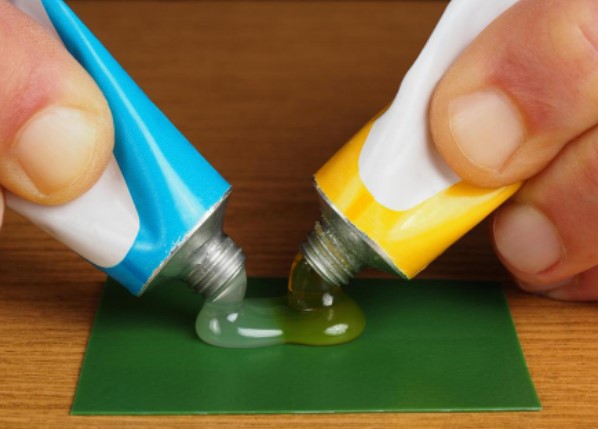You probably have several dishes with epoxy resin art. Let’s face it, these pieces are beautiful and a great addition to any kitchen. The artwork does look beautiful on cups, plates, tumblers, and servings.
However, is resin dishwasher safe? The short answer is NO. No epoxy resin cup, tumbler, or plate should be out in a dishwasher. Art resin cannot withstand the high heat in the dishwasher without getting soft. The high heat can cause the resin to melt leading to damage to your dishes.
Epoxy resin is food safe once dried and cured. However, you still need the art specification when buying new dishes. Washing such dishes in the dishwasher might compromise their safety.
Let’s dig deep and see how to clean resin and whether it’s food safe.
Contents
Is Resin Dishwasher Safe?
No, the resin is not dishwasher safe. You should manually clean epoxy resin to avoid damage. Epoxy resin will soften and eventually melt under high temperatures. This can happen since dishwasher water is heated to ensure efficient cleaning.
With several cheap dishwashers available nowadays, you might be tempted to clean them by machine. However, you should not try washing resin in a dishwasher.
What Is Epoxy Resin?
Before we get started, let’s understand what epoxy resin is. The resin comprises a two-part plastic material. It’s also called polyepoxide or polyester resin. The plastic is mixed with a hardener to create a solid material.
The material is waterproof, solid, and durable leaving many wondering why it’s not dishwasher safe. It’s used in various other applications like jewelry and woodworking.
So, why can’t you put resin in a dishwasher despite its durability?
Epoxy resin is not made to withstand heat. While the resin can withstand some heat, it starts to soften when temperatures go above 120 degrees F.
Even when completely cured, resin still melts at high temperatures. If you’ve worked with resin before, you’ll notice the liquid drying up and solidifying. When it becomes hard, it’s cured.
Rising the temperatures to a certain state (120 degrees F) impacts the curing. The same can happen if you leave the resin outside in the sun for days. This is usually the case for persons that live in areas with high temperatures.
To simply put it, the solid state of resin can be reversed when exposed to heat. This is a common problem for people that live in hot areas. You’ve probably seen plastic melt when left exposed to the sun for hours.
In some cases, the resin might not melt, but art dishes in the dishwasher will become disfigured and soft. There are instances where you might not notice the changes. This typically happens when you let the dishes cool before unloading the dishwasher.
There are just so many reasons why resin should not be cleaned in a dishwasher.
First, when exposed to high dishwasher temperatures, the resin can melt and stick to various components of the dishwasher. It can also spread to other dishes creating a mess. You don’t want to damage your expensive dishwasher because of a simple mistake.
Secondly, the malleable resin can get into the food you consume. Make sure you only take foods and drinks from epoxy resin pieces that are fully cured. When it becomes malleable, some trace amounts of epoxy might get into your food causing health concerns.
As you can see, washing resin in a dishwasher is not just a matter of damaging the art, it’s also a health concern. This is why you find most resin tumblers, cups and plates have FDA approval for safety reasons.
Handwashing a few resin dishes should not be a big deal. That’s unless your cabinet is only full of resin dishes. So, how does one clean resin dishes?
How To Clean Resin?
You can easily clean resin pieces by hand using warm water and a soap detergent. The one thing you need to avoid is overly hot water and alcohol. You don’t want something that can reverse the curing process.
I’ve already explained how hot water in the dishwasher can deform and soften the resin. Generally, the pieces are not hard to clean.
Handwashing with mild warm water and dish soap remains the best way to clean resin. When cleaning, make sure you use soft sponges that will not cause any scratches.
How do you wash thin plastic plates for children? That’s the same way you should wash resin. You don’t have to worry about any sanitary issues. Resin is waterproof when cured, therefore, easy to clean and maintain.
Once the resin is wiped clean and rinsed, make sure you dry it. While the water might not cause any problems, it is advised you dry it. You don’t want the resin becoming cloudy or discolored.
Overall, resin cleaning is simple and safe. You just need to make sure resin is not exposed to heat for prolonged periods. If you clean your resin pieces right, you can be sure they will stay durable for years.
While some new dishwasher models support delicate cleaning, it’s still advisable you clean resin pieces by hand.
Is Resin Food Safe?
Resin is food safe when cured and used correctly. This is an important health question to ask. With epoxy cups, travel mugs, and plates becoming so popular, it’s essential to know whether they are food safe.
Almost all resin pieces are food-safe when fully cured. However, it’s significant to know how resin pieces are made and the characteristics of the resin. This will ensure the proper use of resin pieces to avoid damage and exposure to epoxy.
First, make sure you consider resin pieces approved by the FDA. Secondly, you need to make sure the pieces are fully cured before you can eat or drink from them.
For individuals making resin cups and plates, you need to understand drying and curing are different. Resin pieces can be dry to touch, but not cured. Most resin pieces will cure in 48 hours to a whole week.
If you happen to have a new resin piece, check the label for the curing time. Also, remember the curing process can be reversed making resin unsafe.
Extra Resin Precautions
Avoid serving hot drinks and foods on resin:
Hot coffee, tea, and water should not be used on resin. We’ve already seen the adverse effect of high temperatures on resin. The hot drinks can easily melt and soften your cup.
Resin pieces are not designed to handle hot boiling water and drinks. You’ll be reversing the curing process and damaging your beautiful pieces.
The only instance where you can use hot drinks is when using tumblers with an inner layer of heat-resistant metal. This is why it’s important to know your resin pieces before using them.
Don’t put it in the microwave:
It’s common sense that microwave high temperatures will melt and deform resin. Sometimes you just want to warm your food quickly.
Consider using ceramic, glass, and other microwave-safe dishes. The resin will not handle the high temperatures.
Avoid alcohol and other soft drinks:
You should not use alcohol and other soft drinks on resin pieces. Apart from heat, alcohol and some soft drinks can strip the resin of pieces. This is the case with strong alcohol and drinks.
When that happens, you’ll notice some discoloration as the liquids strip off the resin.
Avoid cutting on resin:
Cutting on resin can cause scratches. Despite the excellent durability, the resin is not resistant to scratches and scraping.
If you have a resin place, then don’t cut anything on it. The resin that comes off from scratches might get into your food.
Overall, the resin is food safe but highly sensitive. Make sure you use it correctly to protect your health.
Bottom Line
Well, that’s it from me about “Is Resin Dishwasher Safe”! After reading this article; you now know resin is not dishwasher safe. However, it’s waterproof and easy to clean by hand. You need some mildly warm water and dish soap to easily clean it.
The biggest issue for the resin is exposure to heat which can reverse the curing process. Nevertheless, the maximum temperatures resin can withstand is 120 degrees F. As long as you use it correctly and clean it by hand, resin pieces are safe and can serve you for years.



